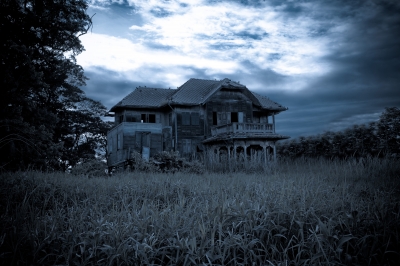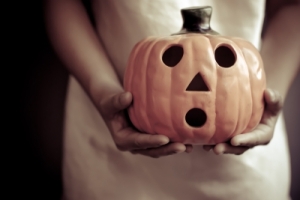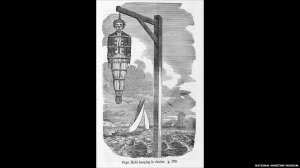
What happens to the house now they are gone?
Hands gather on the iron gate. Fingers that cannot hold are slipping through the bars to grasp the air, left burning even by the faintest touch. A line of desire stretching as far as the onset of night on the plantation fields is visible. Somewhere beyond, daylight has just left, and is streaking away.
What happens now the rooms are all shut up? Locks turned in every key hole, windows barred with thick blocks of iron. Rust is gathering on the panes, on the old door handles and window frames. Gasping, those who wait outside the walls are aching for the decay inside that house.
Dr Barnstable has long since left. He took with him his servant and his big, leather bag. The clasp snapped shut on his box of tricks, the claw hammer has nailed its last. He is going into retirement now, never to come back to this place. The stake and sacrament can be left to someone else, he says, as his servant merrily throws open the gate. There is blood on his collar and cuff, gore trails the trouser leg, but a pipe is lit and a night of comfort is waiting for old Dr Barnstable and his servant.
What happened afterwards? There had been a fire in that old place, just before the sun went down. They all saw it, the ones outside the gate. They saw a burning in the attic window, and a figure on fire, plummeting to Earth like Lucifer, evaporating on the North Wind in a pathetic final puff of desperate half-life.
Now the house is empty. Only the living can enter, and none will buy the place. Left to rot on the old plantation, the house sleeps restlessly, and the dead watch it. They are gnawing at the gate post, digging in the dirt until it stings them. Their limbs disappear, their essence annihilated while others take their place. It is the Holy Water burning them but they will not leave the house of their King, even long after Dr Barnstable dispatched him into thin air.
Slipping past the crowds of phantom watchers the gate will easily swing upon your touch. You put the cold, iron key back in your pocket and proceed because you did not hear them cry to see a living soul walk where they cannot. Down the gravel path to the sound of cawing crows, to the beating wings of ravens and the creak of the bows of the antique scarecrow. Knocked down and losing his stuffing, birds have pecked out his eyes and in the patch, pumpkins are rotting.
Towards the house your steps are crunching on the pebbles. The leather of your newly shined boots is scuffing and your tailored jacket is too fine to resist the cut of the wind through the corn field. It stretches away out to right and something perpetually rustles through it along the rows.
The house is here and waiting. The door you unlock with another, newer key. They changed the locks. Dr Barnstable ordered it done and the man came on Sunday and now the key is small and neat in your hand, and sparkling. But see how it turns uncertainly in the lock. The man has made rough work, the key struggles, you twist and twist. The key snaps. The door, as if aware of the resistance, opens creaking loudly, you think it could almost be laughing.
The house is barren now. Holy Water on the hearth, the door jam smeared with brick dust from a pouch. There is the smell of burnt sage wafting down from the gallery like a host creeping down the stairs to greet you, now that the old host is gone. Trails of blood will never be washed from the floorboards, decades of viscera smeared into the carpet. Half the rooms are shut up, and will never be opened again. The others are places where graveyard earth has been scattered . Consecrated broadcasting, Dr Barnstable was thorough as he sewed the Holy grains from space to space. It doesn’t matter that no one will ever buy the place.
The dead waiting in droves at the gate spend hours just sniffing. They long for the night when the smell of sanctity finally ebbs and flows away. Its sacred atoms scattered to the wind, just like their King. Inside the house you stare out of a French window. Is there something unusual about the line of darkness beyond the tall, black fence?
A picture collapses down the wall, but you only jump inside. Are you afraid to move? The key is broken, you think. You have to call the man back tomorrow, but he will only come on a Sunday. Dr Barnstable has gone back to Germany. There you go, he is saying to you again in your memory, it’s your inheritance now.
Dr Barnstable died in his bed in the brand new hotel. The hotel with the plump towels and the bright lights and monogrammed bathrobes. His servant found him face down in the scatter cushions with lash marks all over his spotted, wrinkled body. They think the local call girl did it. They found a leaflet in his trouser pocket with her picture on it. Vampira. She looks to old to be only 16.
You are standing in the kitchen looking out at the herb garden. You laugh because they won’t be growing garlic in there. You need to laugh because it’s getting colder and you only wanted to see the place. You’re staying at the little inn on the crossroads because you don’t have Dr Barnstable’s bag of tricks. You don’t even know he’s dead. No one can reach you on your room phone, it’s ringing off the hook and hits the ground. The servant replaces his receiver and quickly packs. He’s thinking about driving out to you, but he has a boat to catch.
What does the house do, now that it is so empty? No one can use these rooms. Fortified against the dead they lie waiting, crumbling into themselves. Ivy is tracing a lineage already up through the cracks, plunging its way into the masonry, hunting out the houses’ heart. You take a look upstairs. The beds are writhing. Beetles are clicking through holes in the Egyptian cotton and take no notice of Holy curses. The master bed is positioned in front of the altar. It hasn’t been slept in in years. You think about going to the attic.
Dr Barnstable said the cellar was fine, but the attic was out of bounds, which sounds ridiculous. Everything Dr Barnstable said was ridiculous, including his fee. You push open the attic door and peer inside. Dust motes are swirling delicately in the moonlight. Your lamp is only disturbing them, clashing with the moon, making monstrous light where shadows should be. The room is resentful. A giant cross is hogging the room. Oh, you think, so that’s where my money went. not only on fancy hotel rooms, and monogrammed bathrobes. The cross has nailed a shadow to the floor. It might have been intended to look like silver, but you’re guessing it’s tin plated. You lift the cross, but it’s heavier than it looks. I paid for it. You say this aloud to the room as it watches you. Somewhere outside the gate, the sniffing stops. You’ll never hear it with your ears.
You drag the cross down the stairs. It’s not going to help you sell the place and the agent is coming first thing on Monday morning because they aren’t as easily spooked as the locksmith. They want the money too much. It’s a big house. Tripping on a loose board, admitting defeat, you lay the cross down on the first floor landing and it falls like stone. The crash disturbs the dust. Something is making your skin prickle. It’s allergies, you say, speaking aloud again.
Taking a last look around you get ready to leave. It really smells in here, the sage hasn’t quite done its job. You glance in the downstairs rooms again quickly. The stains are starting to get to you, but they can do all sorts of things now with chemicals. You don’t want to have to pay for new carpets. You never even knew you were the last surviving relative. It’s too much work, and your business won’t run without you.
That’s when you stop, and see the stairs.
The cellar. But you don’t need to go down there. It’d be damp and the smell will be worse. Still, people will pay good money for a wine cellar. Your lamp goes out in a puff. You retrieve your matches and light it, but something feels, different. It’s truly dark now. You can no longer gaze out of the French window and see the line of shadows because they are now indistinguishable from darkness.
Every step is an adventure. You’re laughing a little nervously because it’s just like being a kid. The sloping wall above the stairs is coated with watery slime and you can’t always dodge the drips. At the bottom is a corridor leading to the rows upon rows of empty stacks. The old miser didn’t leave you any rare vintages. You search around and peer into abandoned alcoves, disappointed to find nothing you’d care to keep. You aren’t even creeped out. It’s even warm down here, strange, the rest of the house is ice cold.
The old master is dead. Dr Barnstable had said before you handed him the cheque. Hocus pocus. It was part of the will, something tacked on at the end by a magistrate official you never got to meet. There was something about a county council, Freemasons, you grunted as you read the will, but there was no fighting it. You had paid up, and now felt a little disgusted that Dr Barnstable clearly hadn’t bothered to make the place look a bit more, respectable. After all, how long could it have possibly taken to perform his mumbo jumbo? His servant had called you and said – in a tone you found unneccesarily cloak and dagger – Would you like to be there when he does it? It had seemed like the entire town was crazy and didn’t realise that Dr Barnstable had connived his way through life and was now probably half-way to Germany with a enough money to buy a thousand silver crosses and teenage girls. No thank you. You replied, and hung up the receiver.
You turn to take the stairs upwards again. You feel less certain now than you did because a hot wind is suddenly at your back. You can hear the old Doctor again, The cellar is fine, I didn’t do too much there, just leave the attic well alone for now. Perhaps it would best if you rent the place, and keep the door up there locked. He had a strange accent. He said he had been adopted. It all made sense. Still, now you’re annoyed that he suggested you rent it. Of course you’re going to sell, of course you’re going to open all these locked doors.
Outside the line is waiting. Still reaching out their hands towards you through the gate. Still risking oblivion for one sniff of their dead King. Somewhere underneath the sage, they can still smell blood. They felt the ground tremble while you were in the attic. They waited in agony. Now the hot breeze is blowing at your back and they are resuming their grasping, frantically pawing the ground in front of the plantation gate.
You worry about what to do with Dr Barnstable’s cross, but you didn’t see the shadow slip from under it, and seep into the wood. The warmth you feel behind you is followed by an aching, roaring, hollow sound as the ground suddenly collapses. Licks of fire are catching at the timbers, ignoring the sage and Holy Water trails. It’s just another job, Dr Barnstable had said, as he had closed the door and felt in his overcoat for the pipe, already imagining the cloying comfort of a cheap floral scent on firm, apathetic young breasts. The fix doesn’t hold if you don’t really care..
You don’t know what is happening as you rush upstairs, but the stairs are collapsing under your feet. Then in an instant there’s a hand on your shoulder, you feel yourself thrust by brute strength upwards onto the floor of the entrance hall. You’re lying on your waistcoat within a finger’s touch of the door but your head is tilted sideways. You’re panting and everything spins so you grip onto the floor. That’s when you notice the house is burning. Outside the gate, hordes are stomping and gnashing, amassing in clots of darkness. A cold hand strokes your neck. Fingers are slipping beneath your collar and you sigh as it loosens the buttons, and rips off your tie. Soon you’ll be able to breathe.
The fingers are caressing your skin lovingly, until suddenly, they stop.
Four nails are plunging into your neck, into the arteries, impaling you in a last gurgle. The arm does not only bend at the elbow, it twists and bends and bends and bends…
A shadow is wearing your clothes. It passes through the door, now left hanging on its broken hinges, swinging with creaks which sound like laughter. Part of what used to be you is leaving, and will never come back.
The fire goes out in the plantation house, smoke smoulders and is caught by the wind but no one will smell it for days. No one will buy it now. Somewhere outside the gate, a trail of black figures trickles away, gnawing at the air, following, sniffing.
One question remains.
In a nearby harbour, Dr Barnstable’s ship is leaving with an extra crate on board. A cold fog has rendered the deck unusually quiet. As he lights the Doctor’s orphaned pipe, his servant wonders to himself:
What happens to the house now that they are gone?
****************
Image by Witthaya Phonsawat, courtesy of freedigitalphotos.net












